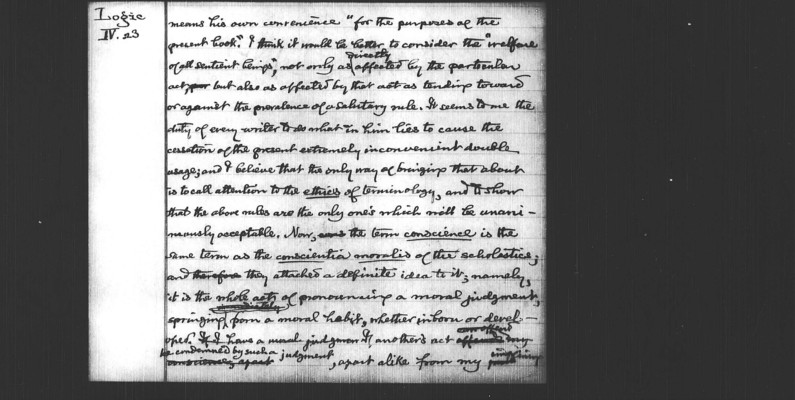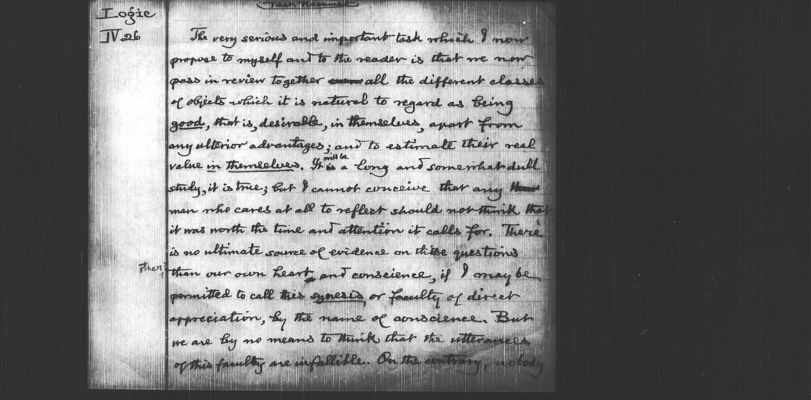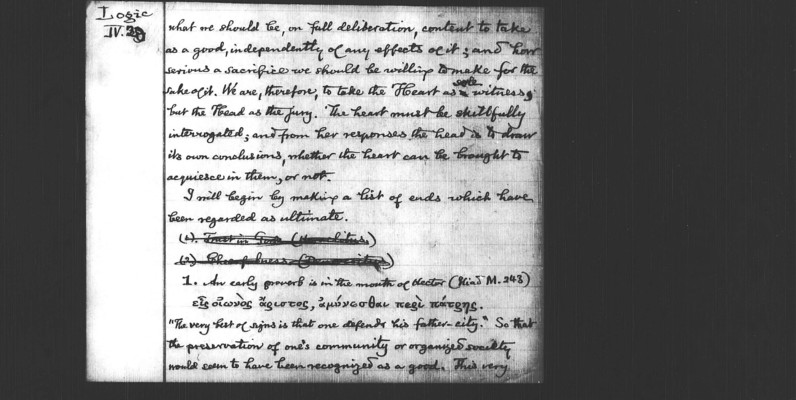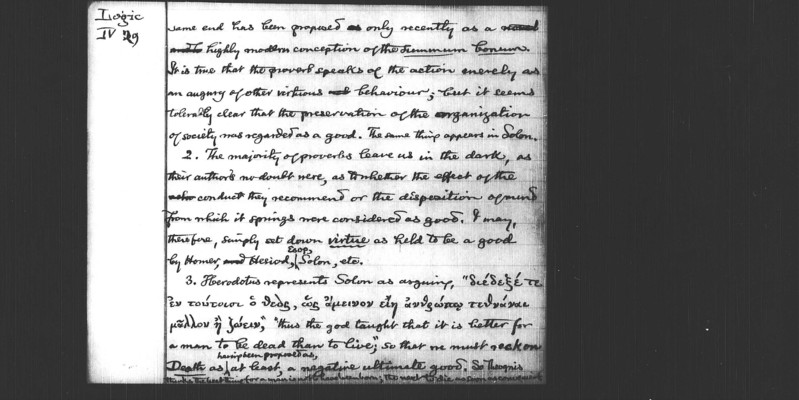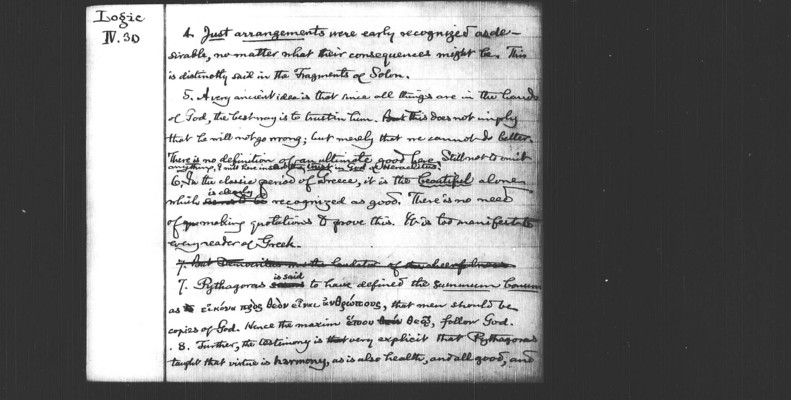Pages That Need Review
MS 434 (1902) - Minute Logic - Chapter IV
12
Logic IV 23 means his own convenience for the purposes of the present book. I think it would be better to consider the welfare of all sentient beings, not only as directly affected by the particular act but also as affected by that act as tending toward or against the prevalence of a salutory rule. It seem to me that duty of every writer to do what in him lies to cause the cessation of the present extremely inconvenient double uses and I believe that the only way of bringing that about is to call attention to the ethics of terminology and show that the above rules are the only one's which will be unanimously acceptable. Now, the term conscience is the same term as the conscientia moralis of the scholastics and they attached a definite idea to it, namely it is the whote acts of pronouncing a moral judgement, springing from a moral habit, whether inborn or developed. I have a moral judgement if anothers act be condemned by such a judgement apart alike from my
13
Logic IV 24 myself in his place and also from my feelings myself bound to blame him which may be doubled, then conscience is to apply to the mixture of judgement, feeling, etc which makes up the act. But a theoretcial enunciation of a principle of ethics is not an act of conscience because it is not the direct issue of a moral habit. Considering how familiar the mixed act of conscience is to usall there cannot be any uncertainty as to which is meant however difficult its analysis may be. But is the second place in view of the fact that we are all never convinced that so serious error can arise from giving one name to an act and the habit from which it springs, we might upon general principles extend to word conscience from the act to the habit so that the term synderesis would be be needed. Yet for the sake of marking the differnce bwtween a word intended to be understood as a
14
Logic IV. 25. Foot note continued technical term of philosophy and a word to be used more loosely and freely it might be well to speak of what we commonly call a "judgement of conscience" as "a conscience" in case we wished it to be taken with philosophical strictness. As a further generalization of the meaning, I think we may allow ourselves to speak of synetic conscience to mean an immediate appreciation of an end as good or otherwise, antecedently to having settled the concetio of moral good. But in the text, I must be understood as using the work in a loose and untechical sense.
15
Logic IV 26 Text resume
The very serious and important task which I now propose to myself and to the reader is that we now pass in review together all the different classes of objects which it is natural to regard as being good, that is desireable in themselves apart from any ulterior advantages and to estimate their real value in themselves. It will be a long and somewhat dull study it is true but I cannot conceive that any man who care at all to reflect should now thinking that it was worth the time and attention it call for. There is not ultimate source of evidence on these questions other than our own heart and conscience, if I may be permitted to call this synesis or faculty of direct appreciation by the name of consicence. But we are by no means to think that the utternaces of this faculty are infallible. On the contrary, nobody
16
Logic IV. 27.
needs to be told that nothis is more insincere or and ignorant of itself than the human heart. In is a dull and medacious witness that needs to be cross examined closely in order to extract from is the real truth. Anything that is usually desireable naturally comes to be regards by us a desireable in itself. Anthing that we strive after we are of course glad to get and we are apt to think that the mere getting of it is so much good, which may be counter-balanced by the circumstance that it leads to nothing further. If I wish to go to England and am sick at sea, then when I am told to voyage is half over, I apt to say to myself "There is no much good to my account, thank God" although in reality unless I am to [fairish] the voyage, my coming so far is more evil. Nor are we questioning conscience to know what we would unnefectively pronouce we wish to kn
17
Logic IV. 28 what we shold be on fall deliberation content to take as a good independently of any effects of it and how serious a sacrifice we should be willing to make for the sake ot it. We are therefore to take the heart as witness bu the head as jury. The heart must be skillfully interrogated and from her responses the head is to draw its own conclusions whether the heart can be brought to acquiesce in them or not. I will begin by making a list of end which have been regarded as ultimate. 1. An early proverb is in the mouth of nectar (Hiad M. 243) [??????]. "The very best of signs is that one defends his father-city." So that the preservation of one's community or organized society would seem to have been recognized as a good. This very
18
Logic IV 29
same end has been proposed only recently as a highly modern conception of the [Summun?] [Conum?]. It is time that the proverb speaks of the action merely as [augmy?] of other virtuous behavior but is seemed tolerably clear that the presentation of the organization of society was regarded as a good. The sme things appears in Solon. 2. The majority of proverbs leave us in the dark as their authors no doubt were as to whether the effect of the conduct they recommend or the disposition of mind from which it spring more considered as good. I may therefore, simply set down virtue as held to be good by Homer, Hesiod Esop Solon etc. 3. Herodotus represents Solon as arguing, [text in foreign language] thus the god taught that it is better for a man to be dead than to live, so that we myst reckon Death as having been proposed as at least a negative ultimate good. So Theognis thanks the best time for a man is not to have been born the next to die as soon as convenient.
19
Logic IV. 30 4. Just arrangements were early recognized as desirable no matter what their consequence might be. This is distinctly said in the Fragments of Solon. 5. A very ancient idea is that since all things are in the hand of God, the best way is to trust in him. This does not imply that he will not go wrong, but merely that we cannot do better. There is no definition of an ultimate good here, still not to omit anything, I will [instant?] trust in God of Hereaclitus. 6. In the classic period of Greece, it is the beautiful along which is closely recognized as good. There is no need of making quotations to prove this. [He?] is too manifests every reader of Greek. 7. Pythagoras is said to have defined the [summun?] Consum as [foreign language text] that men shold be copies of God. Hence the maxim [foreign text] follow God. 8. Futher the testimony is very explicit that Pythagoras taught that virtue is harmony as is also health and all good and
20
Logic IV. 81 God so that everything owes its existence and consistency to harmony. There can the be no doubt that harmony was held to be an ultimate good even if we most unnecessarily doubt Pythagoras's so holding is. Certainly this does not in the least conflict with 7 but on the contrary agrees very well with it. This seem to agree with the opinion of Heraclitus that man has ony to conform to the order of world in order to find satisfaction [foreign text]. 9. Those who have made a careful study of the fragments of [Danoeritus] (as I am sorry to confess I have not) seem to think that he held cheerfulness [foreign text] the summum Corum. He called it [foreign text]. 10. Anaxagoras when asked what made life worth living replied according to the [Eudemean?] Ethics for the study of the order of nature [foreight text]. So that they study of nature was held to be good. 11. [Pythagoras?] was not disposped to admit that pleasure
21
Logic IV. 32 was a good unless it were honorable while Socrates thought that in itself apart from its consequences pleasure is good (Protagoras p. 351, B and C) and was rather surprised that Protagoras should side with the [relgar?] on that point. He Socrates thought that the important point to consider was the duration of the pleasuer as well as its intensity. Various things make me think that this passage in the Protagoras correctly represents Socrates, even if the whole dialogue is not historical. The opinion expressed is not Plato's own. Xenophon fully bears out this view. (See Zeffler. Socrates and the Socratic Schools 3rd Ed of Translation. Part II Chap. vii C) But the doctrine could not have been at all a prominent point in the teachings of Socrates. 12. The [Cynics?] as is well known held pleasure to be a positive evil. The only good was virtue and virtue was knowledge. Yet they despised all knowledge that was not practical and useful thus completing a circle. Their stupic theory of knowledge would seem to reduce that to obstinate self-consistency and
